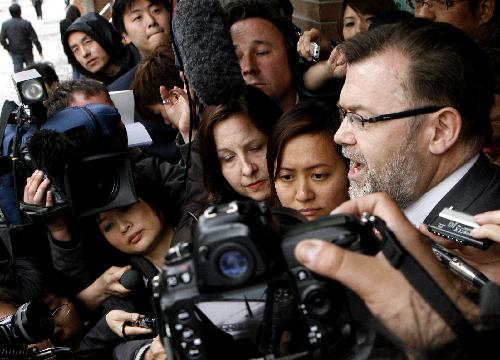| Videos | ? Latest |
|
? Feature | ? Sports | ? Your Videos |
Rio Tinto verdict handed down in Shanghai

The four defendants in what's become known as the Rio Tinto case have received jail terms for bribery and stealing commercial secrets. The verdicts against the four, including one Australian, were handed down Monday afternoon by the Shanghai Number One Intermediate People's Court.
|
|
|
Australian Consul-General in Shanghai Tom Connor (R) speaks to the media outside the Shanghai First Intermediate People's Court in Shanghai, east China, March 29, 2010. Four Rio Tinto employees, including Australian citizen Stern Hu, were sentenced in Shanghai on Monday after a Chinese court last week found them guilty of accepting bribes and stealing commercial secrets. Hu was sentenced to 10 years in jail while his three co-accused, Chinese nationals Liu Caikui, Wang Yong and Ge Minqiang were sentenced to jail terms ranging from seven to 14 years. [Xinhua] |
The Australia's iron ore giant says the verdict in the case will not derail its effort to continue building a good relationship with China. The company's chief executive notes bribery is a clear violation of Chinese law and Rio Tinto's own code of conduct.
The jail terms range from 7 to 14 years.
Among the four convicted, Australian national Stern Hu was sentenced to 10 years for bribery and stealing commercial secrets. His assets were confiscated and he was fined one million yuan.
Wang Yong, the head of the company's iron ore sales team in China, received the longest term of 14 years in jail.
All of the four defendants' illegal earnings will be recovered.
Many Shanghai residents felt the court handled the case in a fair manner.
"In China, receiving bribes is a very serious matter. Everyone should abide by the law, or the rules would be broken by all. " Shanghai resident said.
"Such things have always happened. After such a long period of economic reform, I think foreigners have had a better understanding of China and they should be able to gradually adapt to what happened. "
The court ruled that from 2003 to 2009, the four used improper means to acquire commercial secrets from Chinese steel companies. They later used this information as a bargaining chip to jack up the price China paid for its iron ore imports.
The court says last year more than 20 Chinese steelmakers paid an extra advance of more than one billion yuan for their iron ore imports, due to the crimes by the four.
 0
0 







